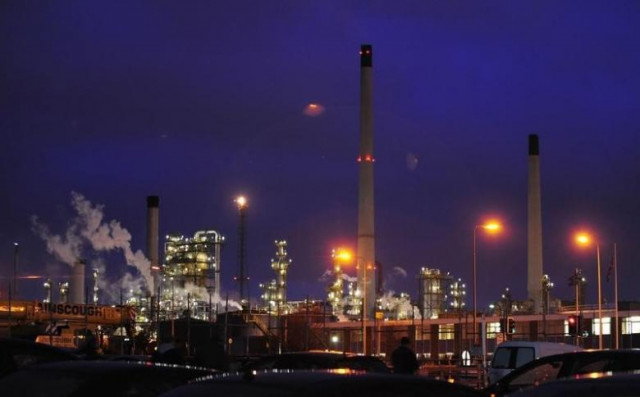Refineries seek price hike for fuel supplied to armed forces
Argue it has become uneconomical to produce jet fuel at current price

Lights shine within an oil refinery. PHOTO: REUTERS
Prices of petroleum products are determined by the refineries and oil marketing companies (OMCs) in line with the parameters approved by the Economic Coordination Committee (ECC).
However, ex-refinery prices are linked with prices of petroleum products imported by the state-owned Pakistan State Oil (PSO). In the absence of such imports, the prices are determined keeping in view the ECC-approved import parity formula based on oil prices quoted in the Gulf Arab market.
Chinese firm keen to set up $2b oil refinery in Sindh
According to sources, the oil refineries have approached the government demanding that the ex-refinery price of Jet Propellant-8 (JP-8), which is consumed by the armed forces, should be increased by Rs1.42 per litre after revising the pricing formula. They argued that JP-8 production had now become economically unviable at the current price.
In this regard, a summary has been sent to different ministries and departments including the finance ministry, Planning Commission and Oil and Gas Regulatory Authority for comments before presenting it to the ECC for approval.
JP-8 is a jet fuel widely used by some big countries for security and defence purposes. Pakistan Air Force and other armed forces also switched over from JP-4 to JP-8 in 2005.
Consequently, the refineries commenced JP-8 production for which they were provisionally offered an ex-refinery price that was equal to that of kerosene oil - a lower grade product - before a separate pricing formula was devised.
Since JP-8 is produced by upgrading kerosene oil with certain special additives - corrosin inhibitor and anti-icing, the refineries have requested a realistic ex-refinery price as the existing price has become uneconomical.
Apart from this, JP-8 requires special arrangements for storage and testing according to specific needs of the defence forces. Its demand has also increased manifold due to growing security and defence needs.
Oil refineries argued that the current pricing mechanism was not encouraging for them to maximise JP-8 production. They suggested that instead of kerosene oil, the JP-8 price should be linked with the existing ex-refinery rate of JP-1, a similar jet fuel being used in commercial aircraft.
OGRA supports oil quality testing by independent lab
The ex-refinery price of kerosene oil is calculated at Rs39.62 per litre while the JP-1 price stands at Rs41.03 per litre. These prices have been determined keeping in view last fiscal year 2016-17 free-on-board (fob) average prices in the international market for Gulf Arab crude.
This indicates that after linking the JP-8 price with that of JP-1, the former’s ex-refinery price will rise Rs1.42 per litre. However, this will vary depending on price movements in the international market.
The Ministry of Energy has also backed the proposal that the ex-refinery price of JP-8 may be linked with that of JP-1 in addition to existing taxes and cost and margins applicable to JP-1 for ex-depot sale price.
Published in The Express Tribune, September 7th, 2017.
Like Business on Facebook, follow @TribuneBiz on Twitter to stay informed and join in the conversation.


















COMMENTS
Comments are moderated and generally will be posted if they are on-topic and not abusive.
For more information, please see our Comments FAQ